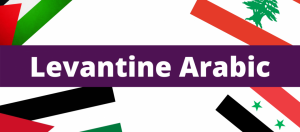Language/South-levantine-arabic/Grammar/Adjectives
Hi South Levantine Arabic learners! 😊
In this lesson, we will focus on adjectives in South Levantine Arabic. Adjectives are an important part of speech used to describe, modify, or quantify a noun or a pronoun. We will explore the different types of adjectives, how they are used in sentences, and their position in relation to the noun. By the end of this lesson, you will have a better understanding of how to use adjectives in South Levantine Arabic. Let's get started!
Don't miss the chance to check out these pages as you wrap up this lesson: Negation, Questions & How to Use Have.
Types of Adjectives[edit | edit source]
Adjectives in South Levantine Arabic can be classified into three different types based on their function and position in relation to the noun they modify:
1. Predicate Adjectives (Adjectives of State)
Predicate adjectives, also known as adjectives of state, describe a temporary state of being or a quality of a noun. They usually occur after the verb "to be" in sentences.
| South Levantine Arabic | Pronunciation | English |
|---|---|---|
| أَنَا مَرْتاح | 'ana martāḥ | I am relaxed |
| الغُرْفَةُ سَاخِنَة | al-ghurfatu sākhinah | The room is hot |
| الطَّعَامُ لَذِيذ | aṭ-ṭaʿāmu laḏīḏ | The food is tasty |
2. Attributive Adjectives
Attributive adjectives describe specific characteristics or attributes of a noun. They usually occur before the noun in sentences.
| South Levantine Arabic | Pronunciation | English |
|---|---|---|
| تَفَاحَةٌ حُمْرَاء | tafāḥatun ḥumrāʾ | Red apple |
| هَدِيَّةٌ كَبِيرَةٌ | hadiyyatun kabīrah | Big gift |
| بَابٌ مَفْتُوحٌ | bābun mafṭūḥun | Open door |
Note: Attributive adjectives must agree in gender and number with the noun they modify.
3. Adjectives of Quantity
Adjectives of quantity describe the amount, degree, or extent of a noun. In South Levantine Arabic, adjectives of quantity usually occur before the noun they modify.
| South Levantine Arabic | Pronunciation | English |
|---|---|---|
| ثَلَاثُ فَتَيَاتٍ كَثِيرَاتٌ | thalāthu fatayātin kathīrah | Many three girls |
| قَلِيلٌ مِنْ الْمَاءِ | qalīlun min al-māʾi | Little water |
| بِضَعَةُ فِصِلٍّ الْأَزْرَقُ | biḍaʿatun fisillan al-azraq | Several blue seasons |
Note: Adjectives of quantity do not change form based on gender or number.
Position of Adjectives[edit | edit source]
In South Levantine Arabic, adjectives usually occur after the noun they modify; however, some adjectives can occur before the noun they modify. Here are some examples:
Adjectives that occur after the noun[edit | edit source]
These adjectives include the majority of attributive adjectives and some predicate adjectives.
- الكِتَابُ الْأَخْضَرُ
(Al-kitābu al-ʾaḫḍaru) (The green book)
- الشَّمْسُ مُشْرِقَّةٌ
(Al-ššamsu mušriqah) (The sun is shining)
- البَطِّيخُ حُلْوٌ
(Al-baṭṭīḫu ḥulwun) (The watermelon is sweet)
Adjectives that occur before the noun[edit | edit source]
Some adjectives can occur before the noun they modify. These adjectives usually provide essential information about the noun, such as nationality, religion, or color.
- الفَتَاةُ الْأُرْدُنِيَّةُ
(Al-fatātu al-ʾurduniyyatu) (The Jordanian girl)
- الصَّبِيُّ الْيَهُودِيُّ
(Al-ṣṣabiyyu al-yahūdiyyu) (The Jewish boy)
- الْعَيْنَانِ الْخَضْرَوَانِ
(Al-ʿaynāni al-ḫaḍrawāni) (The green eyes)
Note: In most cases, adjectives of nationality or color occur before the noun they modify.
Practice Dialogue[edit | edit source]
Here is a dialogue to practice using adjectives:
- Person 1: أَنْتَ كُلُّ يَوْمٍ تَشْرَبُ الْقَهْوَةَ الْعَرَبِيَّةَ الْمُذَاقُ الْمُرُّ. (ʾAnta kullu yawmin tašrabu al-qahwatu al-ʿarabiyyatu al-muḏāqu l-murru.)
(You drink Arabic coffee with a bitter taste every day.)
- Person 2: لَا أَنَا أُحِبُّ الْقَهْوَةَ الْتُرْكِيَّةَ الْحُلْوَةَ أَكْثَرَ. (Lā ʾanā ʾuḥibbu al-qahwata alturkiyyata al-ḥulwata ʾakthara.)
(No, I prefer Turkish coffee that is sweeter.)
Conclusion[edit | edit source]
In conclusion, adjectives are an important part of speech used to describe, modify, or quantify a noun or pronoun. In South Levantine Arabic, adjectives can be classified into three types based on their function and position in relation to the noun they modify. By understanding the types of adjectives and their position, you can improve your ability to use South Levantine Arabic accurately and fluently.
To further improve your South Levantine Arabic grammar, you can use the Polyglot Club website. Find native speakers and ask them any questions!
➡ If you have any questions, please ask them in the comments section below.
➡ Feel free to edit this wiki page if you think it can be improved. 😎
Having concluded this lesson, consider checking out these related pages: Say Hello and Greetings in South Levantine Arabic, How to Use Be & Gender.
Other Lessons[edit | edit source]
- Gender
- How to Use Have
- Questions
- Give your Opinion
- How to Use Be
- Plurals
- Conditional Mood
- Pronouns
- Negation

